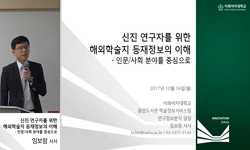Like most early English novels, Robinson Crusoe is a hybrid narrative with heterogenous elements like spiritual autobiography, colonial fiction, or adventure story. In this essay I read Robinson Crusoe as a novel of double rhythm where both Christian ...
http://chineseinput.net/에서 pinyin(병음)방식으로 중국어를 변환할 수 있습니다.
변환된 중국어를 복사하여 사용하시면 됩니다.
- 中文 을 입력하시려면 zhongwen을 입력하시고 space를누르시면됩니다.
- 北京 을 입력하시려면 beijing을 입력하시고 space를 누르시면 됩니다.

초월적 섭리의 신과 스피노자의 ‘신 즉 자연’: 『로빈슨 크루소』의 이중 리듬 = Christian God of Providence and Spinoza’s “God, or Nature”: Double Rhythm in Robinson Crusoe
한글로보기https://www.riss.kr/link?id=A108505542
-
저자
이혜수 (건국대학교)

- 발행기관
- 학술지명
- 권호사항
-
발행연도
2023
-
작성언어
Korean
-
주제어
Daniel Defoe ; Robinson Crusoe ; spiritual autobiography ; Spinoza ; Ethics ; Gilles Deleuze ; univocity of being ; nature ; power (potentia) ; conatus ; common notion ; 다니엘 디포 ; 『로빈슨 크루소』 ; 영적 자서전 ; 스피노자 ; 『윤리학』 ; 질 들뢰즈 ; 존재의 일의성 ; 자연 ; 역량 ; 코나투스 ; 공통개념
-
등재정보
KCI등재
-
자료형태
학술저널
- 발행기관 URL
-
수록면
109-135(27쪽)
- 제공처
-
0
상세조회 -
0
다운로드
부가정보
다국어 초록 (Multilingual Abstract)
Like most early English novels, Robinson Crusoe is a hybrid narrative with heterogenous elements like spiritual autobiography, colonial fiction, or adventure story. In this essay I read Robinson Crusoe as a novel of double rhythm where both Christian God of Providence and Spinoza’s “God, or Nature” (Deus Sive Natura) play out their singular roles. Double rhythm in Robinson Crusoe is notable particularly in the context of recent environmental crisis such as the COVID 19 or Climate Change. Nature, or Spinoza’s God, exists in the novel silently yet tenaciously working as an inexhaustible and tolerant underlying potential that embraces a domineering modern man who thinks that he “conquers” nature. In other words, Spinoza’s thought of “the univocity of being” along with his immanent concept of God underlies and permeates into Nature in Robinson Crusoe while providential and anthropomorphic God looms in Robinson’s spiritual journey and his colonial self as well. Moreover, the double rhythm of the text is also found in the meaning of Robinson’s labor in the desert island. On the one hand, Robinson’s work is seen as an epitome of the ethics of labor in Protestantism associated with the spirit of capitalism. On the other hand, it could be interpreted as an instance of the Spinozist ontology of power (potentia). Following his conatus, Robinson survives through his labor and production with the consequent increase in his power of “action” and “understanding”; he not only improves in his surroundings but acquires Spinozist common notions that sometimes lead him into a glimpse of univocity of being.
국문 초록 (Abstract)
대부분의 초기 영국소설처럼 다니엘 디포(Daniel Defoe)의 『로빈슨 크루소』 (Robinson Crusoe 1719)는 모험 이야기, 영적 자서전, 식민주의 서사 등 이질적 형식들이 섞여 있는 혼종성을 지닌다. 이 ...
대부분의 초기 영국소설처럼 다니엘 디포(Daniel Defoe)의 『로빈슨 크루소』 (Robinson Crusoe 1719)는 모험 이야기, 영적 자서전, 식민주의 서사 등 이질적 형식들이 섞여 있는 혼종성을 지닌다. 이 글은 『로빈슨 크루소』의 이러한 혼종적 특징을 염두에 둔 채, 기존 비평에서 별반 언급되지 않았던 작품의 주요 지점, 즉 기독교(프로테스탄티즘)적 섭리의 신과 더불어 스피노자의 ‘신 즉 자연’이 작품의 독특한 이중 리듬을 만들면서 의미를 형성해나가는 지점들을 살펴본다. 『로빈슨크루소』에 신이 존재한다면 그건 로빈슨을 섭리로 이끄는 기독교의 초월적 신뿐만이 아니다. 자신의 본성의 필연성에 따라 무한히 많은 방식으로 무한히 많은 만물을 생산하고 또 생산의 역량을 본질로 하는 스피노자적 신, 즉 자연 역시작품의 배경에 그치지 않고 서사 전체를 떠받치는 힘으로 작용한다. 『로빈슨 크루소』에서 펼쳐지는 무인도의 대자연, 로빈슨 같은 인간 하나가 아무리 총을 쏘아대고 자신을 섬의 왕이라 여기며 잘난 척 해봤자 이에 개의치 않고 유구히 자신의 리듬에 따라 생산하고 흘러가는 자연의 존재는 서사의 단순한 배경이 아니라 소설의 의미를 좌우하는 중요요소인 것이다. 작품에 나타난 두 신들의 대결은 모순되어 보이는 두 로빈슨—초월적 신의 이름으로 자연과 원주민을 정복·지배하는 로빈슨, 그리고 자신의 코나투스에 따라 자연의 리듬에 맞추어 노동하면서 활동역량과 이해역량을 늘려가는 로빈슨—의 묘한 공존이라는 작품의 또 다른 이중 리듬과도 연결된다. 본문에서는 먼저 스피노자의 ‘신 즉 자연’ 개념이 함축하는 ‘존재의 일의성’의 사유를 질 들뢰즈의 해석을 중심으로 살펴본다. 두번째 절에서는, 마치 스피노자의 ‘신 즉 자연’을 닮은 듯 누가 보지 않아도 부지런히 만들고 배우는 로빈슨의 노동을 스피노자적 역량의 존재론의 관점에서 읽는다. 그 과정에서 일어나는 성공과 실패, 무지와 배움을 통해 독자는 무인도의 로빈슨에게 긴요했던 것이 그를 이끄는 섭리의 신뿐 아니라 그의 존재와 부재(죽음)를 의미있는 사건으로 만들어주는 스피노자적 신(실체)의 변용으로서 타자(양태)임을 알게 된다.
동일학술지(권/호) 다른 논문
-
Les hétérotopies de Sophie Calle: L’Erouv de Jérusalem
- 한국비교문학회
- Simon Kim
- 2023
- KCI등재
-
에릭 로메르의 영화 ‘녹색광선’ 속 소설의 반영과 변용
- 한국비교문학회
- 황혜영
- 2023
- KCI등재
-
문학과 문학성 개념에 대한 재론(1): 개념의 역사적 기원과 의미의 중층성
- 한국비교문학회
- 정의진
- 2023
- KCI등재
-
포스트-미디어 환경에서 국가 트라우마 재현 양식 변화에 대한 연구: 제주 4.3을 재현한 작품을 중심으로
- 한국비교문학회
- 강경래
- 2023
- KCI등재




 KCI
KCI KISS
KISS






